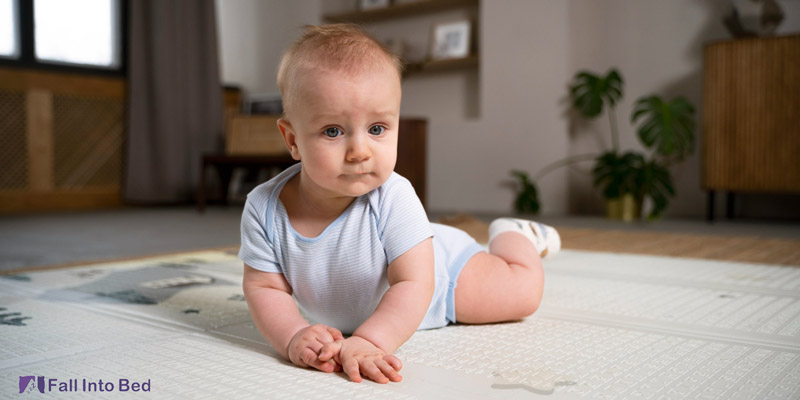Getting your 10-month-old into a good sleep schedule can feel like a real challenge, but it’s so worth it for everyone’s sanity. Babies at this age are going through lots of changes and hitting new milestones, so their sleep needs can change too.
In this article we’ll talk about how much sleep your little one needs and provide a sleep schedule for you to use. So, stay tuned!
How long should a 10 month old nap?
Ideally, babies at 10 months, take two naps during the day for a total of 2.5-3.5 hours. Each nap takes more than an hour but no linger than 2.
During this time, babies can’t have a long wake window and the two naps in between their night-time sleep, helps restart the wake window.

How many naps should a 10 month old take
At ten months old, most babies typically take two naps a day. These naps usually happen in the mid-morning and early afternoon, helping them recharge and stay happy throughout the day. Each nap can range from 1 to 2 hours, though every baby is different, so some variation is normal.
As long as your baby is getting enough overall sleep they’re likely on the right track.
10 month old sleep schedule
This is a sleep schedule sample for your 10 month-old. you can pick on of these samples. But keep in mind that your day might look differently and according to your routine, you can edit this schedule:
| TIME | ACTIVITY |
|---|---|
| 7 a.m. | Wake time |
| 10 – 11:30 a.m. | Nap 1 ( 3 hours of wake window before the first nap) |
| 3- 4:15 p.m. | Nap 2 ( 3.5 hours of wake window before the first nap) |
| 7:30 p.m. | Bedtime💤 |
How much sleep does a 10 month old need?
Most 10 month-old babies need around 12-15 hours of sleep in a 24-hour period. This time is usually divided in a 10-12 hours of sleep at night and a total of 2.5-3.5 hours of naps during the day.
What are some 10 month old milestones?
At 10 months, babies typically reach several developmental milestones across various domains. During this time, babies hit some pretty exciting milestones that really show off their growing independence and curiosity.
They start crawling more confidently, eager to explore every nook and cranny of their surroundings. Many begin to pull themselves up to stand, gripping onto furniture for support.
Their fine motor skills improve too, as they master picking up small objects with a pincer grasp. Babbling gets more complex, and you might even hear them say simple words like “mama” or “dada”.
Socially, they become more interactive, enjoying games like peek-a-boo and responding when you call their name. It’s an amazing time that highlights just how quickly they’re growing and ready to discover the world around them.

Is there a sleep regression at 10 months?
The 10 month old sleep regression happens when a healthy 10 month old baby with a normal sleep schedule, suddenly starts to wake up at nights, have difficulty falling back to sleep and have changes in their sleep cycle.
Sleep regression can almost happen at any age, up until 24 months old. We can see the most sleep regression in month 2,4,8,12 and 24.Sleep regression in 14 months, and 15 months and 16 in also normal. You can check out the recommended sleep schedule for 15 month-olds here.
Though it might feel like it’s never going to end, the phase will end after a few weeks. During this time, it’s important to manage a consistent sleep schedule for your 15 month-old baby.
FAQs about 10 month old sleep schedule
What time should my 10-month-old go to bed?
Bedtime for a 10-month-old is usually between 6:30 PM and 8:00 PM, depending on the child’s nap schedule and wake-up time.
How long should each nap be for 10-month-olds?
Each nap should ideally be between 1 to 2 hours long, though it’s possible for some babies to have shorter or longer naps.
How can I help my baby sleep through the night?
Establishing a bedtime routine, ensuring a comfortable sleep environment, and practicing good sleep habits can promote better night-time sleep.








